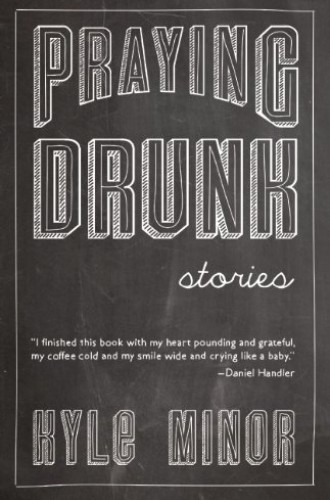Despair and resistance
Kyle Minor's second collection of short stories follows the success of his first, In the Devil's Territory, with acclaim. It is a beautiful work—and one that I believe promises more than it delivers.
Minor is a gifted writer with a facility for the bizarre and the dark, and he keeps an empathetic insider's eye as he wends his way through American fundamentalist Christianity, contemporary Appalachia, missionary Haiti, and the dystopian future. His individual stories, which sustain an amazing variety of voice, could each stand alone. But they also lightly cross-reference one another as the book progresses, providing a subtle but illuminating backdrop behind the work as a whole. I got whiffs of Raymond Carver, Stephen King, and the postmodern graphic novel. These are signs of a dextrous and pioneering storyteller.
A faint pattern emerges in Minor’s loose meta-narrative: the lives, disasters, and delusions of a highly conservative, quasi-charismatic American Christianity and its fallout. A flair for the sickening abounds in this realm; but, speaking as a former Pentecostal with West Virginia kin, that's certainly not all there is to it. Minor knows this. But while there are times when the tale flows masterfully, there are others when you wish Minor would cut it out already with the firehose.
Case in point: the book’s second story, "You Shall Go Out with Joy, and Be Led Forth with Peace," is about a young boy who quotes Bible passages to himself during repeated beatings by an older child at a Christian school. As the story follows his life into adulthood, it is haunted by failure, tragedy, and a relentless and grungy agony. Minor doesn't flinch from the brutal realities of spiritual trauma, and he gives convincing voice and shape to his characters and their lives. But by the end, the irony of the title falls hard toward the heavy handed.
This sets the precedent for what I see as the book's biggest weakness. Yes, what these characters go through is agonizing. Yes, life is dark and strange, and if God were the source of darkness, strangeness, and terror it would be the most terrifying thing of all. But the presentation of human suffering in these stories often seems to carry an unnecessary emotional commentary, a lack of restraint, that risks or commits (sometimes literal) overkill. And when, as my grandma says, one "gives the devil too much credit," the devil himself disappears and you can't do anything about him.
That is to say, these stories are most powerful, most real, when despair isn't simply taken for granted as a core principle of existence, when there's a sense of real resistance to it. Gleams of light—even obscured, dim ones—add much to the sense and power of Minor's stories. Otherwise his book is tempted toward the maudlin.
Minor shows real composure—in fact he shines—in the collection’s longest stories, "There Is Nothing But Sadness in Nashville" and "In a Distant Country." The book's title doesn't lie: there's still a lot of praying in these stories, and a lot of drunk. But there's a control here, and a proper volume, that give the stories their maturity and strength.
"In a Distant County" is told through letters from several people covering the same series of events related to a missionary effort in Haiti; "Nashville" is told by a trucker from Tennessee. In these stories, Minor’s characters aren't entirely doomed to interact in a sad and pointless universe—and his ear for colloquial language and its inherent drama is focused and flawless. His sense of humor and his dogged belief in beauty stand out unusually well here, too. Minor is gentle with these characters; he believes in them and loves them. There's no less tragedy, but a background noise is quietened, and a fresh, sensitive American gothic sensibility begins to sing out.
Good and beautiful truth-telling can be done with dark and chaotic material, of course. But there is something about Praying Drunk that seems too engaged behind the scenes in some gory, unresolved argument with the universe to gather its proper breath and strength. If there exists such an argument, it needs to quiet its frantic glossolalia, crawl out from under the body count, and try, try again. Because there is much left to be told about America's obsessions and failures in conservative Christianity. And there's no doubt Minor is a writer to do it.





